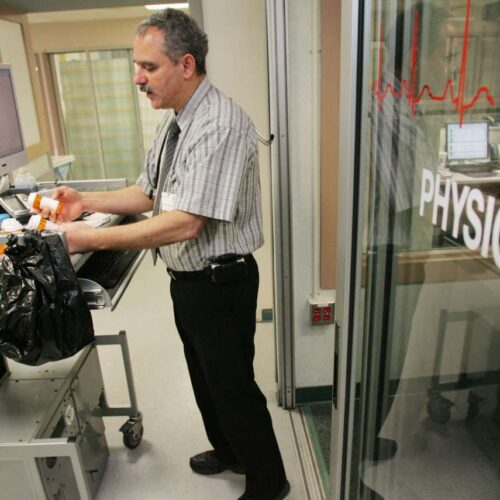Introduction
Six Georgia primary care physicians have filed a lawsuit seeking to end the cozy relationship between Medicare administrators and a committee of doctors that influences the fees physicians are paid by the federal health program for the elderly.
A draft of the suit, which was obtained by iWatch News, alleges that the Centers for Medicare & Medicaid Services (CMS) and its parent agency, the Department of Health and Human Services (DHS) violate several federal laws, including the 2010 Affordable Health Care Act, in relying on the American Medical Association/Specialty Society Relative Value Update Committee, or RUC, to value physician services paid for by Medicare.
The lawsuit was filed in U.S. District Court in Maryland, near CMS headquarters, which is located outside Baltimore.
Since 1991, the RUC, which is comprised of 26 voting physician members, has proposed specific values for 7,000 medical procedures and tests and imaging values to CMS, which pays doctors based on a system called the Resource-Based Relative Value Scale (RBRVS). Technically, the values are only suggestions. But since 1991, CMS has overwhelmingly rubber-stamped RUC recommendations, accepting more than 94 percent, according to AMA statistics — leading to accusations that Medicare is letting payment rates be determined in part by the very people who will receive those payments. The workings of the RUC and the controversy over its practices were detailed in an iWatch News report last November, which is referenced in the lawsuit.
Today’s lawsuit is the latest shot fired at the RUC by primary care physicians — the general practitioners and family doctors patients often contact first — who say the committee helped create and enforce the a wage disparity for physicians that benefits specialists. The pay gap (a cardiologist makes $100,000 more per year than a primary care doctor, according to a 2010 study published in the journal Health Affairs) has driven medical students away from primary care to more lucrative specialties, which health policy experts say has led to a drastic shortage of family doctors.
“They (CMS) have used this committee to establish physician fees in a way that is illegal,” said Paul Fischer, who is a plaintiff in the suit along with five of his physician partners from the Center for Primary Care in Evans, Ga., a suburb of Augusta. “Those fees have promoted expensive procedures that often have marginal value and have starved primary care.”
The AMA has said the committee is nothing more than an independent group exercising its First Amendment right to petition the federal government. Today’s lawsuit, however, charges that the RUC serves as an “uncharted and unofficial federal advisory committee” to the federal government, staffed by physicians with “significant financial ties” to medical and pharmaceutical companies. By law, federal advisory committees are required to hold public meetings and keep public records of proceedings, which the RUC does not do. RUC meetings are by invitation only. Member votes are secret. Minutes or transcripts of meetings are not available to the public.
“Attendees at the AMA RUC meetings must sign a confidentiality agreement prohibiting them from discussing the contents of the meetings,” according to the suit, and “persons violating those confidentiality agreements have been sanctioned by the AMA.”
In addition, the lawsuit charges that CMS and HHS violate the Constitution by delegating the job of developing Medicare procedure values to the RUC. The suit also alleges that the agencies violated the 2010 Affordable Care Act by failing to establish a process to validate Medicare procedure values.
“CMS has failed to realize that twenty years of AMA RUC control over the physician fee schedule has resulted in a process that is irrational, arbitrary, and absolutely destined to lead to the continued devastation of primary care,” the suit claims.
Ellen Griffith-Cohen, a CMS spokeswoman, declined to comment because the agency has a policy of not discussing pending litigation. One former CMS official, however, said the agency has little choice but to rely on RUC to value procedures. “CMS doesn’t have the resources to do anything but rely on the RUC,” the official said. “They are getting millions of dollars of free labor.”
In an email response to the lawsuit, Dr. Barbara Levy, chair of the RUC, said: “The RUC is the voice of physicians – an independent panel of physicians from all medical specialties, including primary care, who make recommendations on the value of the work and resources involved in patient care. The AMA makes the data and rationale for each RUC recommendation publicly available.”
But that data is only available for a price. Asked where data and rationale for RUC recommendations are kept, an AMA spokeswoman forwarded a link to an association publication, for sale for $320 for non-members.
According to the lawsuit, the AMA benefits financially from the RUC, which costs the association $6 million yearly to run. According to the lawsuit, the AMA obtains approximately $56 million annually from the “sale, licensing and, and other intellectually property” of CPT codes, which physicians use to bill Medicare and other insurers for procedures. The codes are created, published and trademarked by the AMA.
The lawsuit is the latest effort by primary care physicians to reform or overthrow the RUC. In June, the American Academy of Family Physicians, which holds a seat on the RUC, asked the committee to add four additional seats representing primary care. In a letter, the academy asked the RUC for a decision by March 1, 2012, six months after the next RUC meeting from Sept. 22 to 25, in Chicago. Among the 26 voting members, Dr. Lori Heim, board chair of the academy, said only three currently represent primary care, even though primary care doctors provide more than 40 percent of Medicare-paid office visits. Earlier in the year, some vocal members of the American Academy of Family Physicians urged the academy to drop out of the RUC altogether.
In March, Rep. Jim McDermott, D-Wash., introduced a bill pushed by family physicians that would require CMS to use independent contractors to identify physician services that are incorrectly valued. The bill would also require an annual review of medical procedures that are potentially over or undervalued. The bill, which was referred in April to the House Ways and Means Subcommittee on Health, has gained no traction in the Republican-controlled chamber of Congress.
In response to the lawsuit, McDermott said he supports “all efforts — whether legislative or judicial —to restore fairness in physician payments and rebalance the physician workforce in the United States.” The lawsuit, McDermott said, “brings to light another important point — that reliance on the RUC is not only bad policy, it may also be a violation of federal law.”
The AMA, which spent $8.5 million lobbying Congress and federal agencies during the first six months of 2011, has built strong ties in Washington. That’s one reason, Fischer said, that he and the other plaintiffs in the lawsuit are taking the issue to court instead of pushing Congress or CMS to act.
“We certainly don’t have the money that the AMA has,” Fischer said, “but we have the law on our side. At some point you have to rely on being right instead of being rich.”
Read more in Health
Manipulating Medicare
$100 million for artificial legs and feet in question
Health
Privacy advocates want stricter rules for online, patient-controlled health records
HHS study on how to proceed is 18 months late, with no target date for completion


Join the conversation
Show Comments